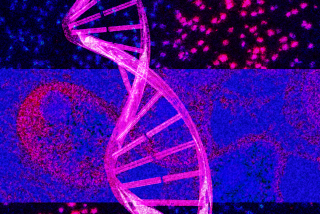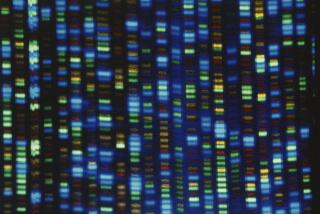Big U.S. gene database will add racial and ethnic diversity to medical research

- Share via
Scientists are getting their first peek at the genes of nearly 100,000 Americans in what’s considered a uniquely diverse genomic database — part of a quest to reduce health disparities and end cookie-cutter care.
The National Institutes of Health released the data Thursday to help researchers start unraveling how people’s genes, environments and lifestyles interact to affect their health. And half of the study’s participants are from racial and ethnic groups historically left out of medical research.
That diversity “will add a kind of knowledge that just isn’t out there,” said Dr. Josh Denny, who heads the NIH’s massive “All of Us” study that eventually aims to have such data from 1 million Americans.
Until now, more than 90% of people in the world’s large genome studies have been of European descent, a lack of diversity that hinders scientific progress, he said.
Russian forces kept up attacks on suburbs of Kyiv and the city of Mariupol and said they used hypersonic missiles to destroy an ammunition depot.
Researchers have been awaiting the genetic information to study some of the most perplexing health disparities.
For example, African Americans have a fourfold higher risk of kidney failure than their white counterparts, “everything else being equal,” said Dr. Akinlolu Ojo of the University of Kansas Medical Center.
“We will for the first time be able to tease out what are the underlying genetic factors” behind that difference, he said.
“This is not just a snapshot in time,” Ojo said, adding that he hopes to finally track how genes and other factors work together to explain why some people survive for years with damaged kidneys while others rapidly worsen.
Today’s healthcare is pretty much one size fits all. Most treatments are based on what has worked best for the average person in short studies of a few hundred or thousand patients.
“All of Us” is part of a push toward precision medicine, a way to customize care based on the complex combinations of factors that determine health, including your genes, habits and where you live as well as age, gender and socioeconomics.
The study is recruiting volunteers from all walks of life — both the sick and the healthy — to share DNA samples, medical records, fitness tracking and answer health questions. Researchers also will cull environmental information about participants’ communities.
While the pandemic delayed enrollment, the NIH said more than 474,000 people have agreed to participate so far and more than 325,000 have provided blood or saliva samples for researchers to start analyzing.
The database that opened Thursday contains the whole genome sequences of nearly 100,000 of the first volunteers — meaning information on all their genes rather than the more common practice of studying a subset.
As with other genomic programs, the NIH team protects study participants’ privacy by removing all identifying information from the data. U.S. scientists seeking to use the database for their research must meet strict requirements.
Individual participants can request to learn the results of their own genetic testing. Last year, the NIH program began releasing ancestral information to participants who asked. Plans are underway to also notify participants who bear certain well-known genetic variants that cause inherited diseases or trigger medication problems.
More to Read
Sign up for Essential California
The most important California stories and recommendations in your inbox every morning.
You may occasionally receive promotional content from the Los Angeles Times.














